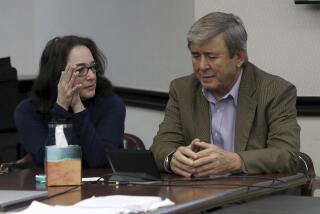New Query Follows Gun Lawsuit
- Share via
It took less than a second for a bullet from a defectively designed Bryco Arms handgun to leave a California teenager quadriplegic, but the bitter legal battle over that accidental shooting a decade ago drags on with no end in sight.
Lawyers for Brandon Maxfield -- the 17-year-old who last year won a $24-million court judgment against Bryco, founder Bruce Jennings and his Nevada distributorship -- have asked a judge to appoint an examiner to study whether fraud was involved in the sale of the controversial Costa Mesa gun maker to its former plant manager.
Paul Jimenez paid $510,000 for Bryco at an Aug. 12 auction in U.S. Bankruptcy Court in Jacksonville, Fla., outbidding donors assembled by Maxfield’s legal team who sought to buy the company to keep it out of business.
Now renamed Jimenez Arms, the company is marketing handguns to dealers through Shining Star Investments, a Texas company owned by Janice Jennings, the former president of Bryco, a Maxfield debtor and Bruce Jennings’ ex-wife.
Bryco was one of the last survivors of a group of Southern California gun makers owned by Jennings, his family and associates. Critics dubbed the companies the Ring of Fire because they pumped out millions of inexpensive handguns that law officers say were favored by criminals.
Jimenez told The Times in June that he would buy Bryco with his “life savings.” But court documents filed since the August sale show that Shining Star wired $430,000 to Jimenez Arms that same day. The money was a down payment on a $1.4-million purchase of 30,000 handguns from Jimenez.
Also that day, Shining Star borrowed $450,000 from a daughter of Janice Jennings, who obtained the funds from a trust set up by her grandparents. George Jennings, her grandfather, founded what critics call the “junk gun” business in 1970.
Shining Star, which was formed in 1999, was issued a federal firearms distribution license this year. One month before the sale of Bryco, Janice Jennings testified that Shining Star was dormant and had no assets -- citing that as the reason she didn’t disclose Shining Star in her bankruptcy filings.
“Didn’t occur to me to list it,” she testified July 1. “It never had a checking account, bank account, savings, credit cards, any business activity whatsoever in it, and I just didn’t think of it.”
Maxfield’s request for a court examiner to study the sale of Bryco is the latest step in his efforts to collect the money that an Alameda County jury awarded him in 2003. In the wake of the judgment, Bruce Jennings, his companies and various family trusts filed for bankruptcy protection.
Janice Jennings did not return a message left at Shining Star seeking comment. But in court documents filed in November, a lawyer for Bruce and Janice Jennings said the fraud allegation was part of “an endless vendetta against the debtors generally and against Bruce Jennings in particular.”
“Bare allegations, innuendo and/or vague suggestions of wrongdoing by the debtor (such as Maxfield’s allegations here) are insufficient to justify appointment of an examiner,” Jennings’ attorney wrote.
A hearing on whether an examiner should study the Bryco sale isn’t expected until at least February.
For Maxfield attorney Richard Ruggieri, the issue is the origin of the money Jimenez got from Janice Jennings to buy Bryco. Ruggieri said Jennings’ lawyers have told him that the trust from which the funds were drawn predates Maxfield’s case.
Financial statements Ruggieri provided to The Times show that the trust contained $153,221 on Dec. 31, 2001, and $685,037 on Jan. 31, 2003. Ruggieri has subpoenaed several sources seeking documentation showing the source of the $532,000 that apparently was added to the account in 2002.
“It could just be a gap in the records,” he said. “But it’s now been over a hundred days since the sale of Bryco, and [all of] the paperwork on this has not been forthcoming.”
Ruggieri has alleged that Bruce Jennings sought to sell Bryco to Jimenez, a longtime associate, as a way to gain control of the company later. Jennings and Jimenez have repeatedly denied this.
Ruggieri says Janice Jennings’ role in forming Jimenez Arms and distributing guns made by it shows that “Jennings family gun profits -- whether they came from George, Janice or Bruce -- has bought Bryco Arms and resurrected it.”
Brandon Maxfield was 7 in 1994 when he was shot by a baby-sitter who was trying to unload a .38-caliber Bryco gun. The sitter had to turn off the safety to unload it, a design that the jury in Maxfield’s liability lawsuit found defective.
Curious, Ruggieri said, he recently obtained a Jimenez Arms 9-millimeter, with a suggested retail price of $189, from a Colorado gun dealer. He said the weapon had the same safety design as the gun Maxfield was shot with.
Jimenez said he hoped to be selling three to five more models by the end of 2005, but he declined to comment on anything involving the sale of the company.
He said that although sales of his 9-millimeter were “not that great” initially, dealers have told him to expect demand to increase soon.
“Several have told me that after the first of the year that they’d be calling me and they said, ‘You better have a lot ready,’ ” Jimenez said. “And I do.”
More to Read
Inside the business of entertainment
The Wide Shot brings you news, analysis and insights on everything from streaming wars to production — and what it all means for the future.
You may occasionally receive promotional content from the Los Angeles Times.










